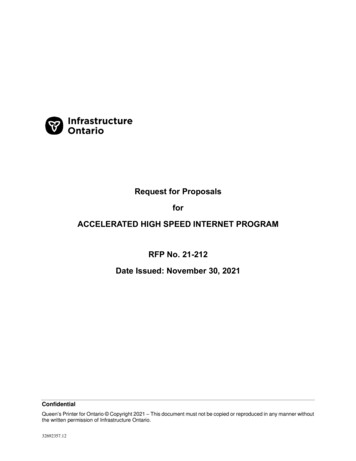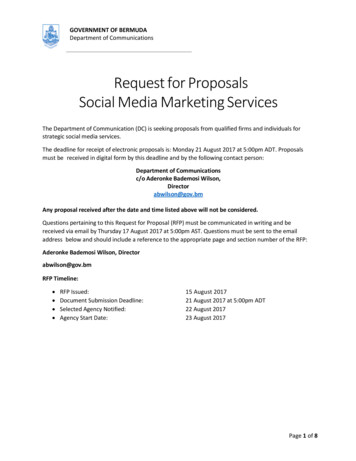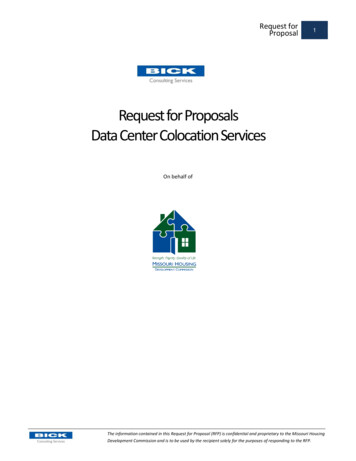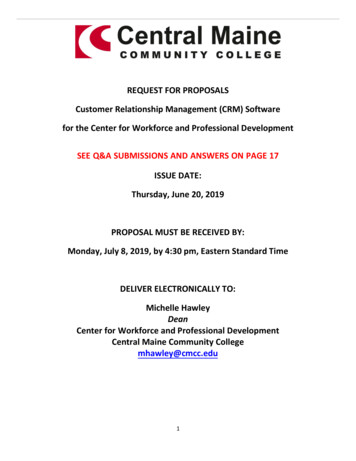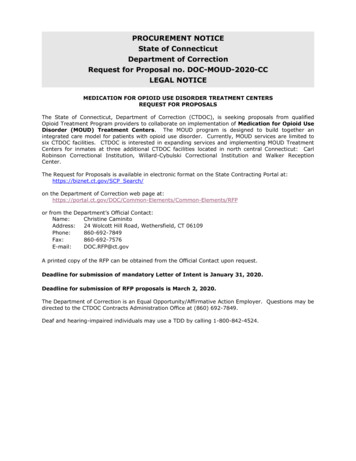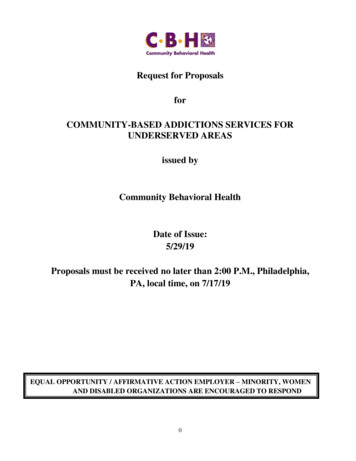
Transcription
Request for ProposalsforCOMMUNITY-BASED ADDICTIONS SERVICES FORUNDERSERVED AREASissued byCommunity Behavioral HealthDate of Issue:5/29/19Proposals must be received no later than 2:00 P.M., Philadelphia,PA, local time, on 7/17/19EQUAL OPPORTUNITY / AFFIRMATIVE ACTION EMPLOYER – MINORITY, WOMENAND DISABLED ORGANIZATIONS ARE ENCOURAGED TO RESPOND0
ContentsI. Project Overview . 4A.Introduction; Statement of Purpose . 4B.Organizational Overview. 4C.Project Background and Objective . 5II. Applicant Requirements – Specific to This RFP. 7A.General Threshold . 7B.Evidence-based Practices. 7C.Tobacco Recovery and Wellness Initiative . 7D.Location/Site . 8E.Service Description. 8F.Individuals Served . 9G.Language and Culture . 9H.Personnel and Required Training . 101. Personnel . 102. Training. 10I.Timetable . 10J.Monitoring . 10K.Reporting Requirements . 10L.Performance Standards . 10M.Compensation/Reimbursement . 10N.Technology Capabilities . 11O.Population Health . 11III. Applicant Requirements – All RFP/Qs . 13A.Threshold Requirements . 13B.Terms of Contract . 13C.Health Insurance Portability and Accountability Act (HIPAA) . 14D.Minority/Women/People with Disabilities Owned Business Enterprises . 14E.City of Philadelphia Tax and Regulatory Status and Clearance Statement. 15F.Compliance with Philadelphia 21st Century Minimum Wage and BenefitsOrdinance . 16G.Certification of Compliance with Equal Benefits Ordinance . 16H.City of Philadelphia Disclosure Forms . 17I.CBH Disclosure of Litigation Form . 17J.Non-Discrimination . 17IV. General Rules Governing RFPs/Applications; Reservation of Rights; Confidentiality andPublic Disclosure; Selection Process . 17A.Revisions to RFP . 18B.City/CBH Employee Conflict Provision . 18C.Proposal Binding . 18D.Term of Contract. 18E.Reservation of Rights . 181. Notice of Request For Proposals (RFP) . 182. Proposal Selection and Contract Negotiation . 193. Miscellaneous . 20F.Confidentiality and Public Disclosure . 200
G.Incurring Costs . 21H.Prime Contractor Responsibility . 21I.Disclosure of Proposal Contents . 21J.General Disclaimer. 21K.Selection Process. 21L.Selection Notification . 22M.Life of Proposals . 22V. Proposal Format, Content and Submission Requirements . 23A.Procurement Schedule . 23B.Proposal Submission Requirements . 23C.Proposal Format . 24D.Proposal Content . 251. Introduction/Executive Summary (not to exceed one page) . 252. Statement of Qualifications/Relevant Experience (not to exceed one page) . 252. Corporate Status . 253. Governance Structure . 254. Program Philosophy . 255. Program Design . 257. Operational Documentation and Requirements . 26E.Interviews/Presentations . 27APPENDIX A RFP Response Cover Sheet Addictions Residential Treatment CommunityBehavioral Health . 28APPENDIX B Treatment Curriculum . 29APPENDIX C City of Philadelphia Tax and Regulatory Status and Clearance Statement forApplicants . 30APPENDIX D CBH Disclosure of Litigation Form . 313
I. Project OverviewA. Introduction; Statement of PurposeCommunity Behavioral Health (CBH) is seeking providers to deliver outpatient addictions treatmentservices in underserved areas. In response to the opioid epidemic in Philadelphia, CBH, theDepartment of Behavioral Health and Intellectual disAbility Services (DBHIDS), and City partnerscontinue to closely monitor the needs of individuals and families battling addiction, includingtracking overdose patterns and service availability across the city. Data has demonstrated anincrease in 2017 in rates of accidental overdose deaths in some areas of Philadelphia, where there isalso a need for additional locally accessible treatment resources. Therefore, a priority of this RFP is toensure access to critical outpatient substance use services for individuals residing in these areas;specifically, applicants are encouraged to provide services in one of the following zip codes: 19115 19142 19143 19145 19146 19147 19153Applications will also be accepted from providers throughout Philadelphia, with the above-listed zipcodes receiving preferential scoring; providers submitting proposals from areas outside of the abovezip codes should provide data (related to opioid use and overdose and availability of local services) tosupport the need for services in that area.Each applicant must be able to provide outpatient addictions treatment services in alignment withAmerican Society of Addiction Medicine (ASAM) Level 1.1Applicants must develop services in a manner that reflects the Philadelphia system transformationas described in the DBHIDS Practice Guidelines for Recovery and Resilience Oriented Treatment,2Mayor’s Taskforce Final Report and Recommendations to Combat the Opioid Epidemic inPhiladelphia.3B. Organizational OverviewThe City of Philadelphia contracts with the Commonwealth of Pennsylvania Department of HumanServices (PA-DHS) for the provision of behavioral health services to Philadelphia’s Medicaidrecipients under Pennsylvania’s HealthChoices behavioral health mandatory managed careprogram. Services are funded on a capitated basis through this contractual agreement. The City ofPhiladelphia, through the Department of Behavioral Health and Intellectual disAbility Services1D Mee-Lee, GD Shulman, MJ Fishman, DR Gastfriend, MM Miller, eds. The American Society of Addition Medicine(ASAM) Criteria: Treatment Criteria for Addictive, Substance-Related, and Co-occurring Conditions (3rd ed. Carson City, NV:The Change Companies, 2013)2Department of Behavioral Health and Intellectual Disability Services (DBHIDS), Philadelphia Behavioral Health PracticeGuidelines, 2013, ice-guidelines-1-1.pdf3City of Philadelphia Mayor’s Task Force, Final Report and Recommendations to Combat the Opioid Epidemic inPhiladelphia, May 17, OTF Report.pdf4
(DBHIDS), contracts with CBH to administer the HealthChoices program.CBH was established as a non-profit organization by the City in 1997 to administer behavioral healthcare services for the City’s approximately 700,000 Medicaid recipients.DBHIDS is comprised the Office of Behavioral Health which includes Mental Health and AddictionsServices and Intellectual disAbility Services (IDS). DBHIDS contracts with Community BehavioralHealth (CBH) to administer behavioral health care services for the City’s approximately 700,000Medical Assistance recipients under Pennsylvania’s HealthChoices behavioral health mandatorymanaged care program. This integrated behavioral health system annually serves more than100,000 people who are eligible for Medical Assistance, as well as those who are uninsured orunderinsured. As a result, CBH manages a full continuum of medically necessary and clinicallyappropriate behavioral health services. CBH employs more than 400 people and has an annualbudget of approximately 800 million.The Department has a long history of providing innovative and groundbreaking services inPhiladelphia for people in recovery, family members, providers and communities and has become anational model for delivering behavioral health care services in the public sector. We envision aPhiladelphia where every individual can achieve health, well-being, and self-determination. Themission of DBHIDS is to educate, strengthen and serve individuals and community so that allPhiladelphians can thrive. This is accomplished using a population health approach with anemphasis on recovery and resilience-focused behavioral health services and on self-determinationfor individuals with intellectual disabilities. Working with an extensive network of providers, DBHIDSprovides services to persons recovering from mental health and/or substance use, individuals withintellectual disabilities, and families to ensure that they receive high quality services which areaccessible, effective and appropriate.This program will be administered by and receive oversight from CBH. CBH is committed to offeringservices to all Philadelphians. The mission of CBH is to meet the behavioral health needs of thePhiladelphia community by assuring access, quality, and fiscal accountability through being a highperforming, efficient, and nimble organization driven by quality, performance, and outcomes.We envision CBH as a diverse, innovative, and vibrant organization in which we are empowered tosupport wellness, resiliency, and recovery for all Philadelphians.C. Project Background and ObjectiveFollowing the May 2017 publication of the Mayor’s Taskforce Final Report and Recommendations toCombat the Opioid Epidemic in Philadelphia,4 CBH, in partnership with DBHIDS and Philadelphiatreatment providers, implemented multiple initiatives to increase access to high-quality, evidencebased substance use disorder treatment. These initiatives included: Increasing authorization timeframes to ease access to residential substance use treatmentservices4City of Philadelphia Mayor’s Task Force, Final Report and Recommendations to Combat the Opioid Epidemic inPhiladelphia, May 17, OTF Report.pdf5
Waiving prior authorization requirements to expedite access to residential substance usetreatment servicesImplementing incentives for existing residential providers to add medication-assistedtreatment (MAT)-compatible servicesRequiring all residential providers to become MAT-compatible by January 1, 2020Tracking admissions timeframes with the aim to decrease wait time between presentationand initiation of treatmentIssuing updated documentation guidelines for all substance use treatment providers toensure compliance with state and federal regulationsIssuing Opioid Use Disorder (OUD) treatment guidelinesProviding multiple trainings to enhance skills and capacity of substance use treatmentproviders, including dual diagnosis trainings for clinician staff and buprenorphine training forprescribersIssuing two comprehensive requests for proposals in 2017 to enhance and supplementsubstance use treatment services across the continuumSupporting the opening of Northeast Treatment (NET) Center 24/7 Access PointDelivering trainings to support the PA Department of Drug and Alcohol Programs (DDAP)transition from Pennsylvania Client Placement Criteria to the American Society of AddictionMedicine (ASAM) as the state-wide standard for level of care determination and servicedeliveryParticipating in the Philadelphia Resiliency Project, 5 including providing direct servicelinkage to individuals living in encampmentsMany of these initiatives have emphasized increasing access to MATs, and previous RFPs haveexpanded hospital and residential treatment services. This RFP aims to expand outpatient substanceuse services so that individuals whose recovery needs can be treated in the community have accessto necessary services.As noted, this RFP will prioritize providers who can deliver services in neighborhoods where there arefewer substance use treatment options and an increasing number of accidental overdose deaths. In2017, the following zip codes saw an increase in accidental overdose deaths as follow: 19145: 42.9% 19142: 167% 19146: 136% 19147: 144% 19153: 6 deaths 19115: 133%67 *19143 is the only South/Southwest Philadelphia zip code that did not have an increase indeaths in 2017; however, 22 deaths were reported, a decrease of only 1 person since resilience-project/Accidental overdose deaths are reported by number once they have reached at least 5 in a zip code. Anything less isreported as “ 5.”7Philadelphia Medical Examiner: ose-data/66
II. Applicant Requirements – Specific to This RFPA. General ThresholdApplicants must be licensed through the Department of Drug and Alcohol Programs (DDAP), ableto bill Medicaid for services, and able to acquire site control by the target service start date.Additional weight will be given to applicants who have current site control. Also, applicants mustnot be on any of the three Federal and Commonwealth exclusion lists or on a Corporate IntegrityAgreement (see III. K. for complete threshold requirements).B. Evidence-based PracticesDBHIDS has a strong focus on the use of evidence-based practices (EBPs) for all levels of servicesthroughout its provider network. The services procured through this RFP must implement evidencebased and empirically-supported approaches to treatment. Training, supervision, and qualityassurance strategies to monitor practice fidelity and track outcomes should be described to ensurethe EBP is being implemented and sustained, and its effectiveness regularly measured. Applicantsmay be expected to meet the standards of the EPIC EBP Program Designation for the main EBPs thatare being implemented in the program. The EPIC EBP Program Designation standards and processcan be found at www.cbhphilly.org.C. Tobacco Recovery and Wellness InitiativeTobacco use is the leading cause of death and disability for those with behavioral health conditions,and tobacco use is significantly higher for this population than those of the general population.Forty-one percent of Philadelphia residents with mental health conditions smoke cigarettes, andnationally, persons with serious mental illnesses such as schizophrenia and bipolar disorder havelifetime smoking prevalence rates as high as 82%.The understanding that people with behavioral health conditions have a right to wellness andrecovery is central to the DBHIDS mission and vision. It is for this reason that DBHIDS has partneredwith the Philadelphia Department of Public Health Tobacco Policy and Control Program and theUniversity of Pennsylvania’s Comprehensive Smoking Treatment Program to form the TobaccoRecovery and Wellness Initiative (TRWI), an initiative that provides implementation support tobehavioral health providers to incorporate evidence-based tobacco dependence treatment intotheir clinical and community practice. The mission of TRWI is to reduce smoking rates by 10 to 15among Philadelphians with behavioral health conditions (and among behavioral health staff) by: Recognizing and addressing tobacco use as a core behavioral health priorityOffering consistent, evidence-based tobacco use counseling and treatment to consumersmembersCreating a treatment (and workplace) climate that fosters tobacco-free environments andtobacco use recoveryTobacco-free environments and tobacco use recovery are effective ways to reduce rates of tobaccouse among persons in acute inpatient psychiatric (AIP) and extended acute care (EAC), residential7
drug and alcohol settings; therefore, DBHIDS has supported these providers in becoming tobaccofree as of 2015 and 2019, respectively. Initiatives to facilitate tobacco-free programming across thePhiladelphia network of behavioral health treatment providers are underway, including acrossoutpatient levels of care. Applicants to this RFP must have establish and maintain a tobacco-freepolicy, including ensuring tobacco use treatment is available (see CBH Bulletin 19-02 for details).D. Location/SiteAs noted, this RFP targets providers to deliver services in the following zip codes: 19145 19142 19146 19147 19153 19143 19115Applications will also be accepted from providers throughout Philadelphia, with the above-listed zipcodes receiving preferential scoring; providers submitting proposals from areas outside of the abovezip codes should provide data to support the need for services in that area (including rates of opioiduse and overdose and availability of local DDAP-licensed treatment providers).Applicants must acquire site control by the targeted service start date, and current site control willbe emphasized in the scoring process. The physical plant must align with core values andrequirements of the DBHDIS Practice Guidelines.8E. Service DescriptionApplicants must be able to provide addiction outpatient treatment services in alignment with ASAMLevel 1. ASAM Level 1 outpatient includes directed screening, evaluation, treatment, and ongoingrecovery services to help the individual achieve changes in his/her alcohol, tobacco, and/or otherdrug use or addiction behaviors, such as gambling. Services at this level generally target individualswho are not experiencing significant withdrawal, are at minimal risk of severe withdrawal, or havewithdrawal needs that are manageable at the ASAM Level 1-WM.9Addiction outpatient services are provided at regularly scheduled sessions of fewer than 9 contacthours per week. Services are tailored to each individual’s level of clinical severity and function; eachtreatment schedule, including number of weekly sessions and lengths of service, must reflect theindividual’s unique needs rather than all individuals receiving uniform programming. Treatmentinterventions should be evidence-based, person-centered, and appropriate for the populationserved, including motivational interviewing, cognitive-behavior therapy, solution-focused therapy,and stages of change. Modalities should comprise individual, family, and group sessions asappropriate.8Department of Behavioral Health and Intellectual Disability Services (DBHIDS), Philadelphia Behavioral Health PracticeGuidelines, 2013, ice-guidelines-1-1.pdf9D Mee-Lee, GD Shulman, MJ Fishman, DR Gastfriend, MM Miller, eds. The American Society of Addition Medicine(ASAM) Criteria: Treatment Criteria for Addictive, Substance-Related, and Co-occurring Conditions (3rd ed. Carson City, NV:The Change Companies, 2013)8
In addition to psychosocial addiction therapies, outpatient addiction services must include medicationmanagement and medication-assisted treatment, to support recovery from substance use disorders,including opioid, alcohol, and tobacco use disorders, delivered by a practitioner with prescribingauthority (physicians, physicians’ assistants, or advanced registered nurse practitioners). Programsmust have “co-occurring capabilities,” and all clinical staff must be trained to understand and respondto co-occurring mental health disorders, with referrals to and close coordination with outsidepractitioners when mental health needs exceed capabilities of outpatient addiction staff. Staff shouldalso be trained in grief and trauma-informed care.Memorandums of understanding (MOUs) should be developed with providers to deliver a holisticand comprehensive continuum of services to include medical treatment (including for individualswith chronic and complex medical needs), vocational and educational supports, and casemanagement. Programs must develop relationships with courts and justice entities who mandatetreatment; protocols should be developed to align with ASAM’s recommendations regardingaccepting individuals with mandated lengths and levels of treatment, including reasonable efforts toensure the most clinically appropriate programming is provided.10 Linkages with CBH CareManagement, CBH Psychiatric Emergency Services (PES) Line, and other treatment providers shouldbe developed to ensure seamless transitions between levels of care. Natural and communitysupports must be accessed and emphasized as part of treatment and discharge planning. A policy forurine drug screen (UDS)/labs monitoring that is individualized and ensures medical necessity fortesting must be established.F. Individuals ServedIndividuals participating in addictions outpatient services per ASAM Level 1 meet the criteria for asubstance use, substance-induced, and/or other addictive disorder as defined in the currentDiagnostic and Statistical Manual of Mental Disorders (DSM). Individuals served at this level are notexperiencing significant withdrawal, are at minimal risk of severe withdrawal, or have withdrawalneeds that are manageable at the ASAM Level 1-WM. They are able to maintain abstinence orcontrol use and/or addictive behaviors and pursue recovery or motivational goals with minimalsupport. They are living in an environment that supports recovery, or they have skills to cope withenvironmental challenges to recovery. They are ready for recovery but need motivating andmonitoring strategies to strengthen readiness; or they need ongoing monitoring and diseasemanagement; or they are not ready for change, but have low intensity in other domains. Medicaland mental health needs are minimal or being managed by an outside provider. See ASAM Level ofCare Placement Criteria for additional details.G. Language and CultureApplicants should develop plans to ensure that the proposed sites are welcoming to people fromdiverse cultures and have the resources to work with individuals and families who speak languagesother than English. The applicant’s description of plans for working with persons from diversecultures should include information on addictions outpatient service strategies and resources to10D Mee-Lee, GD Shulman, MJ Fishman, DR Gastfriend, MM Miller, eds. The American Society of Addition Medicine(ASAM) Criteria: Treatment Criteria for Addictive, Substance-Related, and Co-occurring Conditions (3rd ed. Carson City, NV:The Change Companies, 2013) – Chapter 2: Applications9
respond to the cultural needs and preferences of persons who live in the identified zip codes. Inaddition to linguistic competence, applicants must consider how outpatient services will ensurecultural awareness and sensitivity to the populations in designated areas.H. Personnel and Required TrainingIt is critical that applicants employ strategic hiring procedures to identify highly qualified candidateswho can support the mission of the addictions outpatient program to provide compassionate andcompetent care. Hiring strategies should aim to form a team whose diversity and lived experiencereflects that of the individuals served, as much as possible.1. PersonnelProposals must meet the minimum requirements in the Pennsylvania State Code; chapter 1223outpatient addictions clinic services and chapter 704 standards for licensure of freestandingtreatment facilities, as well as all applicable ASAM staffing standards.2. TrainingIn addition to participating in all CBH mandatory training, all staff must be trained on the followingtopics: Mental Health First Aid Trauma Grief Co-occurring disordersI. TimetableIt is expected that all services requested through this RFP will be fully operational by 9/16/19.J. MonitoringPrograms selected will be subject to evaluation, program, compliance and budgetary monitoring byDBHIDS and CBH. On site reviews including participation in treatment teams may occur as deemednecessary by CBH.K. Reporting RequirementsBy accepting an award under this RFP, applicants agree to comply with all data reportingrequirements of CBH. To fulfill the data reporting requirements, successful applicants must workwith CBH and, where applicable, the CBH Claims, Clinical, Information Services, and QualityManagement to ensure the quality and completeness of data. Reporting requirements may bemodified prior to or during the contract award period.L. Performance StandardsThe selected applicant will be required to meet CBH credentialing, compliance, and performancestandards. All successful bidders will be expected to have a compliance plan along with all otherrequired documents for initial credentialing.M. Compensation/ReimbursementApplicants will be required to submit an ongoing operations budget as the basis for negotiation with10
CBH. This budget must include all operating costs such as staff, administrative costs, ongoingsupplies, ongoing building expenses including rent and maintenance, etc.The applicant is to use the budget forms which are provided separately on the DBHIDS website todevelop each budget. Be sure to label clearly the start-up and ongoing operations budgets. All tabsmust be completed. The budget should incorporate all the requirements of the RFP.Please use the miscellaneous item detail tab for any category not included on the form. Pleaseprovide information for all the categories in th
recipients under Pennsylvania's Health hoices behavioral health mandatory managed care program. Services are funded on a capitated basis through this contractual agreement. The City of Philadelphia, through the Department of Behavioral Health and Intellectual disAbility Services 1 D Mee-Lee, GD Shulman, MJ Fishman, DR Gastfriend, MM Miller, eds.







